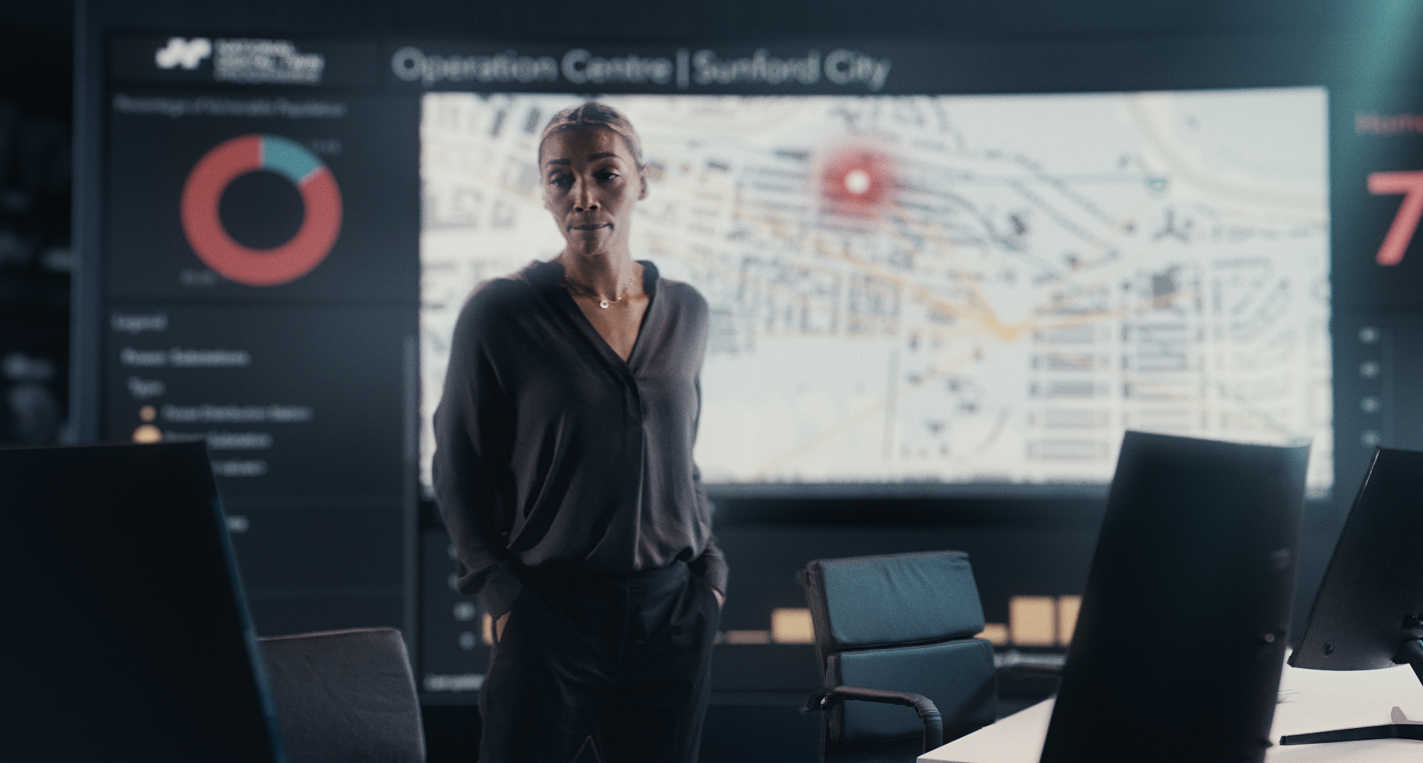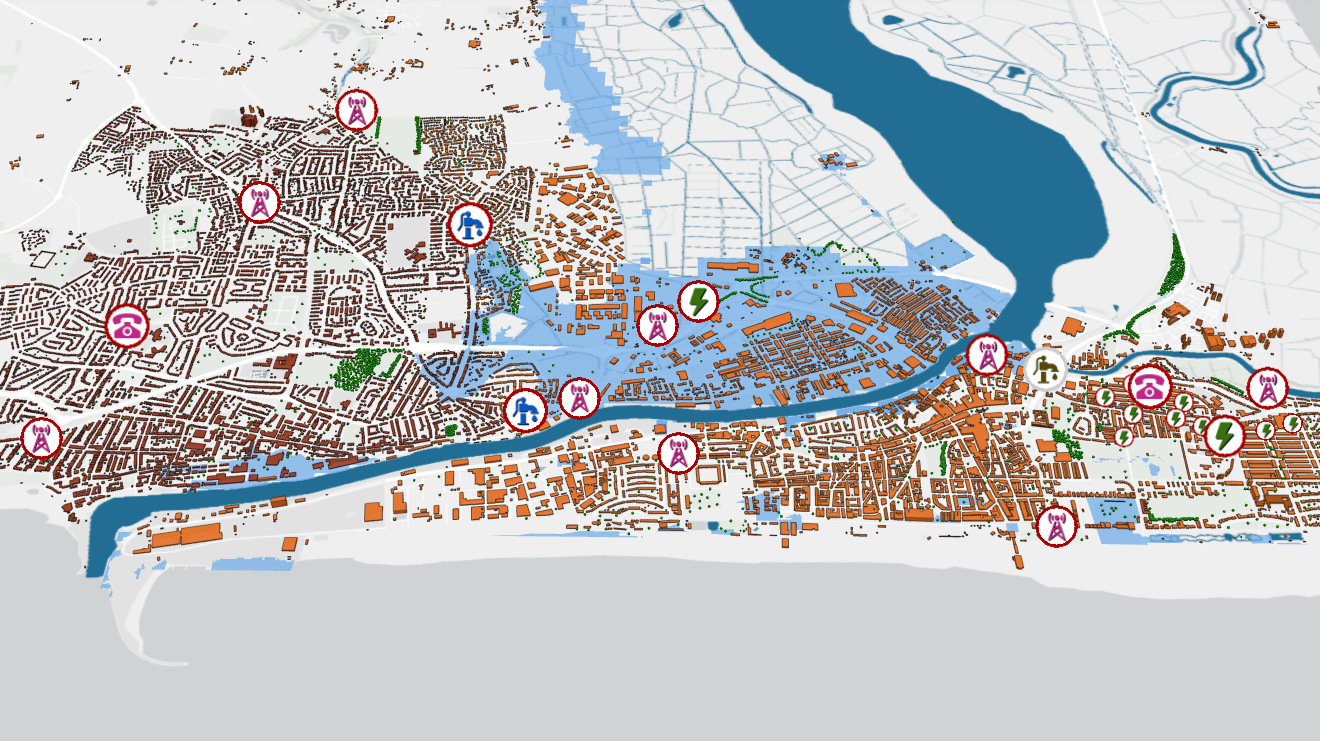
Submitted by Kirsten Lamb on Thu, 04/11/2021 - 12:42
Collaboration through connected digital twins is key to tackling climate change
The National Digital Twin programme (NDTp) and partners on the Climate Resilience Demonstrator (CReDo) are pleased to announce two exciting, public-facing outputs for the UN Climate Change Conference (COP26). The poignant short film, Tomorrow Today, shows clearly the essential role of infrastructure resilience in the climate emergency, and the interactive app allows users to explore how connected digital twins can help plan for better resilience. These premiered at the CReDo COP26 webinar on 2nd November and can now be explored on the Digital Twin Hub.
Directed by BAFTA winner Colin O’Toole (Cowboy Dave, 2018), Tomorrow Today tells the story of Arthur and his grandson Jack facing the unprecedented Storm Ruby, which has the potential to knock out multiple utility services and threaten lives. The film stars Paul Copley (Last Tango in Halifax, Downton Abbey), Sam Bottomley (Ladhood, Wolf Hall), the voice of Sam Spruell (Snow White and the Huntsman), and Hopi Grace (Time, Emmerdale) as Clara, the digital twin engineer. It has been produced by Crocodile Media in partnership with Little Monk Pictures.
The interactive app, developed by the NDTp together with ESRI UK and in partnership with Mott MacDonald, introduces the fictional Sunford City. The city experiences a series of severe storms, driven by climate change, that cause a cascade of emergencies across the city and hamper the ability of utility networks to recover. Users can test different scenarios by using isolated digital twins versus connected digital twins to see how this enables them to make decisions to better protect the city. This demonstrates how connecting datasets and digital twins across organisations and sectors through the National Digital Twin is vital to future infrastructure resilience and is on the critical path to Net Zero.
About CReDo and the NDTp
The film and app give an insight into the CReDo project, which was initiated by the NDTp. CReDo is providing a tangible example of the value of connecting digital twins across infrastructure sectors. CReDo focusses on enabling better climate resilience decisions for our energy, telecoms and water infrastructure systems in response to extreme flooding. CReDo is developed in partnership with Anglian Water, BT and UK Power Networks and funded by UKRI, the Connected Places Catapult and the University of Cambridge. The film and app carry the key message of CReDo, that collaboration through connected digital twins is key to tackling climate change.
The NDTp is run by the Centre for Digital Built Britain, a partnership between the University of Cambridge and the Department for Business, Energy and Industrial Strategy. Endorsed by HM Treasury in July 2018, the NDTp was set up to deliver key recommendations of the National Infrastructure Commission’s 2017 'Data for the Public Good' report.
National partners and project objectives
Collaborating on the Climate Resilience Demonstrator (CReDo) project with the National Digital Twin programme are Anglian Water, BT and UK Power Networks, who will use their asset and operations data combined with environmental data to inform an increased level of infrastructure resilience.
The project is being delivered through a collaboration of research centres and industry partners; the Universities of Cambridge, Edinburgh, Exeter, Newcastle and Warwick are working alongside the Hartree Centre, DAFNI, Science and Technology Facilities Council, CMCL Innovations, the Joint Centre for Excellence in Environmental Intelligence and Mott MacDonald. It is funded by UK Research and Innovation (UKRI), the Connected Places Catapult and the University of Cambridge.
Using an Information Management Framework (IMF) approach, which is being developed through the NDTp, CReDO will enable the partners to share data across a secure platform. CReDo will demonstrate the capability of the IMF approach to connect digital twins in a principled, scalable way to inform decision making in capital and operational planning, reducing the cost and disruptive impact of extreme weather events and increasing resilience. This collaborative project will demonstrate the potential of a National Digital Twin to deliver beneficial outcomes for people and the planet.
Sarah Hayes, the project’s lead and author of the report Data for the Public Good, says, “Following the recent statement by the Environment Agency that ‘It is adapt or die’ when it comes to climate-driven flooding, CReDo’s outputs could not be more timely. We want the film and app to connect with everyone, from asset owners to the public, and remind them that lives are at stake. We need to build more resilience into our systems, and that takes collaboration. As Clara, the engineer in the film, says, ’We have the technology, we just need to share the data.’”
Tom Collingwood from STFC Hartree Centre, who is the CReDo Project Architect, responsible for designing the and delivering the technical plan for the project, says, “Trying to predict and mitigate the effects of climate change when you can only see a small part of the bigger picture is almost impossible, and I’m excited to have a key role in steering the technical delivery of such a challenging and ambitious project, helping industries build a more joined-up view of how our national infrastructure could be impacted in the coming years.”

